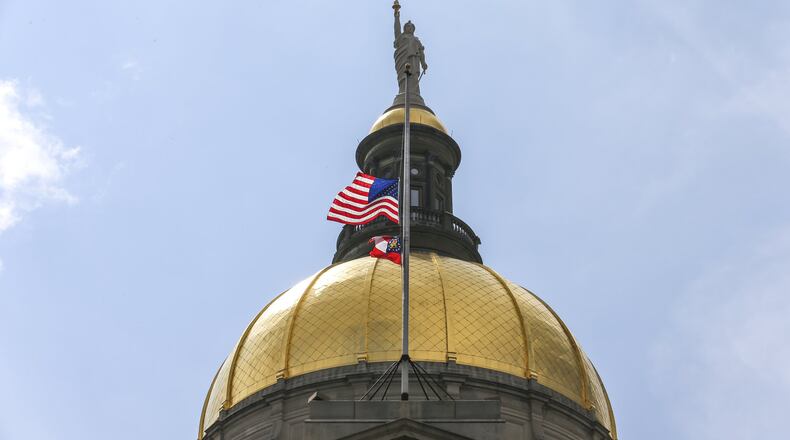Randell E. Trammell is the founder and CEO of the Georgia Center for Civic Engagement, which educates and equips students to become informed citizens. He works with school districts across the country in developing policies and programs to bolster civic ideals.
In this guest column, Trammell explains the origins and purpose of a new state commission on civics education created this year by the Georgia Legislature. The commission has riled some conservatives who contend it could turn into an entry point of liberal dogma into the classroom.
By Randell E. Trammell
A classic song of the 1970s by Simon & Garfunkel, “Bridge Over Troubled Water,” serves as a picture of what is hoped to be accomplished through the Georgia Commission on Civic Education.
A recent guest column on the AJC Get Schooled blog is the second article in as many days warning of the impending doom and consequences of creating such a commission. As one of the key architects of the legislation sponsored in the House by state Rep. Matthew Gambill, R-Cartersville, and in the Senate by Sen. Chuck Payne, R-Dalton, I can speak authoritatively about the intentions of the legislation and the commission it created. I am writing to set the record straight about the commission and hopefully, as the lyrics of the last chorus of this song says, “ease your mind.”
Early in my career, I was told to confront the elephant in the room. The elephant in this room is political extremes on each side pulling and rooting for their home teams to advance a particular agenda or good old-fashioned defense to block movement of the other team. A political adage that is appropriate is “if you can’t convince them, confuse them.”
Credit: Courtesy photo
Credit: Courtesy photo
The organization I serve, the Georgia Center for Civic Engagement, has a mission to educate and equip students to become informed and active citizens. We are a nonpartisan nonprofit that collaborates with schools, public and private, all over the state. Our mission seeks first to educate and inform students prior to equipping them to be active. Students must understand their rights and responsibilities to be prepared to live up to the promise of “liberty and justice for all” contained in those rights and responsibilities.
No doubt, we are living in times fraught with stark political differences. I would say the times are worse than ever before, but a brief read through American political history will quickly remind us that the election between John Adams and Thomas Jefferson was quite bitter (so much so that Adams left in the middle of the night prior to Jefferson’s inauguration to avoid attending). We can’t forget the Lincoln-Douglas debates. Those got quite nasty as well — this is where the “House Divided” concept was introduced. And let us not forget the famous duel that led to the death of Alexander Hamilton, who was shot by political rival U.S. Vice President Aaron Burr. We are not living in unique times — at least in the case of contrasting of political ideas.
One of the main talking points popular in local Georgia school board meetings has been surrounding the curriculum that is being taught in the classrooms. Every parent and citizen has a right to and should be interested in what our students are learning. The state Board of Education sets the standards that are to be taught, and because of local control policies, it is the local boards of education that determine how and what is taught.
While there may be some instances of teachers gone wild using their position of trust to indoctrinate those who come before them, I would say this is by far the exception and not the rule in Georgia classrooms. I am privileged to work with thousands of teachers every year across the state and what I have found is individuals who love their students, endure incredible ridicule working with resources they provide for themselves in many instances, and do well to have the time to teach the standards they are required to teach.
Before I am accused of being Pollyannaish, there may be isolated cases of teachers getting into the weeds. They can share their personal views just as good through the algebra and art history courses as they can social studies.
It would probably shock most folks reading this that the average elementary school student receives somewhere around 30 minutes of social studies per week. There’s a good chance they spend more time waiting in line for the water fountain weekly than learning about our nation’s founding documents, principles, and history. That is what should be a major area of concern — and is one of the areas that the Georgia Commission for Civic Education will examine.
The commission, composed of 17 members, will meet two to four times a year to review the conditions, needs, issues, and problems related to civics education and issue an annual report to the General Assembly, and recommend any action or legislation it deems necessary. Great care has been taken by each of those appointing members to represent diverse opinions from the legislative bodies, members of the executive branch and judiciary, business organizations, educators, and the public. While we are still awaiting the announcement of appointments from the governor and House speaker, other appointments include Georgia Supreme Court Justice Charlie Bethel, Attorney General Chris Carr, State School Superintendent Richard Woods and representatives from apolitical organizations including the Association of County Commissioners of Georgia and the Georgia Municipal Association.
The commission is designed to rise high above the political currents and be that “bridge over troubled water” to ensure that Georgia’s students are citizen-ready when they graduate. Our students deserve our very best — and our democracy demands it.
About the Author
The Latest
Featured




